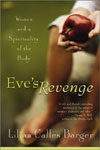It's a good thing Stanley Kurtz said it all
here, because learning about HBO's newest show,
Big Love, about a fictional polygamous family has me speechless!
Take this astounding observation by Ginnifer Goodwin, the actress playing Margene, one of Bill Henrickson's (Bill Paxon)
three wives on the show, when she says that for many women, polygamy "is the answer to their problems, not a problem in and of itself." WHA?!?!?
What kind of alternative gender universe does Ms. Goodwin live in? Any woman who has attended middle school or high school knows the one thing that draws out the worst in women is OTHER WOMEN. Now, obviously the reverse is also true, that women can also draw out the BEST in other women but typically that isn't the case when it involves winning the attention of a man...
What is saddest to me is the idea that women are well-served by polygamy. I wonder if anything could be further from the truth. Women are wired for relationship in a way that is unique and different from men. This isn't to say men aren't relational- please don't hear that- but simply that women are profoundly different than men when it comes to relationships. As one of my oft-quoted favorite writers Sharon Hersh discusses, in the Garden of Eden, man was created first and was alone, whereas woman was created from man, and after man, so that from the very beginning woman identified being as"being in relationship to another" whereas man, in his very nature, understands being as "alone" and ALSO being as "in relationship to another".
The consequence of this observation becomes profound as Hersh goes on to say that in her practice as a counselor, and through a number of studies, she has found that men tend to express fulfillment when they achieve a sense of independence and self-sufficiency whereas women tend to express fulfillment when they achieve a sense of security in relationships. Note that this doesn't have to mean relationships with men, but just relationships with other people.
I ponder on this as I think about Ginnifer Goodwin's statement that polygamy is good for women. Can it be that constant competition and comparison and envy and all the other complexities sharing a sexual partner entails really
helps women develop a sense of security in relationships? What about their children and the assurance that they will never have their father's full attention? How do you maintain a sense of stability when one man's commitment is divided 4 ways?
Hardly seems like Big Love to me, it's more like one Big Lie and I concur with Kurtz that this sort of pop culture activism has frightening consequences for how we define family, and ultimately society. Is polygamy really the building-block definition of the family institution upon which we want to build our culture? yikes.















